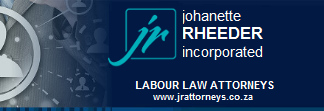Document Preview
Document Details
- Title
- Chairing and initiating in disciplinary hearing
- Description
- A comprehensive guide to managers and Human Recourses how to investigate misconduct, charge employees, initiate and chair a disciplinary hearing. It includes topics such as procedural and substantive fairness, schedule 8 of the LRA, progressive discipline, codes of conduct, charges, suspension, preparing for the hearing, how to conduct a hearing, leading and cross examining witnesses, evaluating evidence, making a finding, mitigation and aggravation and sanction.
- Category
- Discipline
- Sub Category
- Disciplinary hearings
- Document Type
- Publication
- Filename
- Chairing a disciplinary hearing PUB.pdf
- Publish Date
- 12/09/2014
- Price
- R310.00
- Author
- Johanette Rheeder
- Document Format
-
 PDF
PDF
81 pages in document, you are previewing the first 2 pages below:
Upcoming Events
Cross Examination Skills
Date: 05/05/2025 09:00:00
Event Type: Distance Learning
Venue: Office / Home
Managing HR Challenges
Date: 12/05/2025 09:00:00
Event Type: Distance Learning
Venue: Office / Home
Basic Labour Relations - LRA & BCEA
Date: 19/05/2025 09:00:00
Event Type: Distance Learning
Venue: Office / Home
Guide to Retrenchments
Date: 26/05/2025 09:00:00
Event Type: Distance Learning
Venue: Office / Home
See more...
2025 © LabourSmart Training (Pty) Ltd. All Rights Reserved. | Developed and Hosted by Resolve Technology Solutions (Pty) Ltd | SEO by NextG


